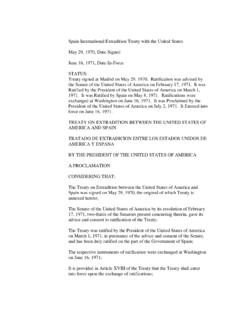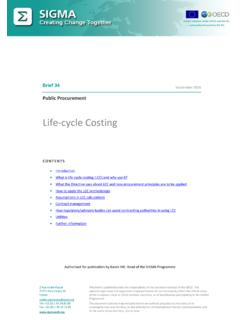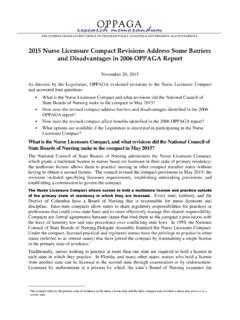Transcription of Germany International Extradition Treaty with the United ...
1 Germany International Extradition Treaty with the United States Extradition Treaty with THE FEDERAL REPUBLIC OF Germany June 20, 1978, Date-Signed August 29, 1980, Date-In-Force MESSAGE FROM THE PRESIDENT OF THE United STATES 96TH CONGRESS SENATE THE WHITE HOUSE, January 19, 1979. To the Senate of the United States: with a view to receiving the advice and consent of the Senate to ratification, I transmit herewith the Treaty on Extradition Between the United States of America and the Federal Republic of Germany , signed at Bonn on June 20, 1978.
2 I transmit also, for the information of the Senate, the report of the Department of State with respect to the Treaty . The Treaty is one of a series of modern Extradition treaties being negotiated by the United States. It expands the list of extraditable offenses to include aircraft hijacking and narcotics offenses, as well as several other offenses not now covered by our existing Extradition Treaty with the Federal Republic of Germany . Upon entry into force, it will terminate and supersede the existing Extradition Treaty between the United States and the Federal Republic of Germany .
3 This Treaty will make a significant contribution to International cooperation in law enforcement. I recommend that the Senate give early and favorable consideration to the Treaty and give its advice and consent to ratification. JIMMY CARTER. LETTER OF SUBMITTAL DEPARTMENT OF STATE, Washington, , October 16, 1978. THE PRESIDENT, The White House. I have the honor to submit to you the Extradition Treaty Between the United States of America and the Federal Republic of Germany (FRG), signed at Bonn on June 20, 1978. I recommended that the Treaty be transmitted to the Senate for its advice and consent to ratification.
4 This Treaty follows generally the form and content of Extradition treaties recently concluded by this Government. The Treaty provides for the Extradition of fugitives who have been charged with any of the thirty-three offenses listed in the schedule annexed to the Treaty . The most significant newly listed offenses, which are not listed in our existing Treaty with the FRG, are those relating to narcotics, including psychotropic and other dangerous drugs, and those relating to aircraft hijacking. Article 1 includes a new jurisdictional provision which allows for Extradition where the offense has been committed outside the territory of the requesting state by a national of the requesting state.
5 This provision is regarded by the FRG as an important new element in the effort to combat acts of terrorism. Crimes committed outside the territory of the requesting state may also provide the basis for Extradition if the offense so committed would also be punishable under the law of the requested State in similar circumstances. It is anticipated that this provision would be useful in the area of narcotic and counterfeiting violations. Similar provisions are contained in the treaties on Extradition with Spain and Norway. Another important addition to this Treaty is a provision in Article 2 which includes as extraditable offenses those which are Federal offenses and punishable by imprisonment for a maximum period exceeding one year in both countries.
6 Article 2 also authorizes Extradition under certain conditions for an attempt to commit or a conspiracy to commit any extraditable offense. Article 2 permits as well the Government of the United States to request the Extradition of a person for any extraditable offense when United States Federal jurisdiction is based upon the use of the mails or other means of interstate communication or transport. Article 3 defines the territorial application of the Treaty . In addition to the normal content of that concept, territorial jurisdiction includes aircraft in flight.
7 This provision extends jurisdiction to acts of aircraft piracy, whether or not they occur over the territory of either of the parties. Article 4, which contains the political offense exception clause, includes a provision excluding from the category of political offenses those offenses which a party has an obligation to prosecute by reason of a multilateral International agreement. This clause, which is a variant of that found in some recent Extradition agreements, is intended to limit the scope of the political offense exception. This exception has been used in the past by certain governments to refuse the Extradition of United States hijackers.
8 Article 7, which is similar to the provisions dealing with the Extradition of nationals in some of our recently signed Extradition treaties, grants the executive the discretionary power to extradite its own nationals. If Extradition is denied on the basis of nationality, the requested state undertakes to submit the matter to its own prosecuting authorities if they have appropriate jurisdiction. The article thus takes into account the law of the FRG prohibiting the Extradition of its nationals but allowing for their prosecution in the FRG.
9 Article 8 contains a prior jeopardy provision, which excludes Extradition in cases where the person requested has been tried and discharged or punished by competent authorities of the requested state for the same offense. Article 12 permits refusal of Extradition unless assurances are received that the death penalty will not be imposed for an offense not punishable by death in the country from which Extradition is requested. A similar article has been included in several recent treaties. Articles 14-30 outline the procedures by which Extradition shall be accomplished.
10 Article 30 provides that expenses arising from the transportation of the person sought will be borne by the requesting state. This article also provides that the requested state shall provide for representation of the interests of the requesting state before the competent authorities of the requested state. This requirement has been included in recent Extradition treaties the United States has negotiated because the costs of presentation are a hinderance to the making of Extradition requests. This article differs from 18 3195, which otherwise requires that all costs or expenses incurred in Extradition proceedings be paid by the requesting authority.










